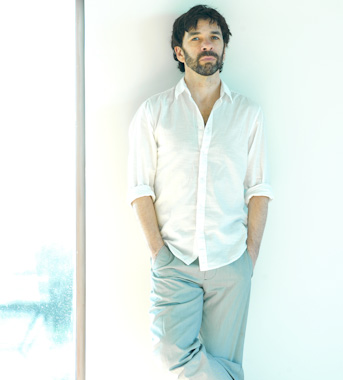Colin Dunne wasn’t exactly born step dancing, but it was close. The man who is known as “a leading figure” in Irish dance, who choreographed part of “Riverdance” and took over the lead role from Michael Flately when he left the iconic musical in 1995, first started going to Irish dance classes as a babe in arms.
“My two sisters had started to go to dance classes when I was six months old and I got to a certain age, my mother threw me in with them,” recalls Dunne, who is soft spoken, brown-eyed, and darkly handsome. “I never remember not liking it. In fact, I remember standing at the door of the house, my shoes in a bag, shouting, ‘We’re going to be late!’”
That was in Birmingham, England, where he was born to Irish parents. Once in the world of Irish dance, Dunne took it by storm. He won his first World Championship title by the age of nine and was the first dancer ever to win the World, All England, and all Ireland titles in the same year. When he finally retired from competition at 22, he had won a total of nine World, 11 Great Britain, and eight All Ireland titles.
He is more than humble about his trove of trophies. “I now question any activity in whereby a nine-year-old can become a world champion,” he says thoughtfully. “I learned a valuable lesson at the age of 10—you can go back the next year and you don’t win. I’m not sure about the psychology of kids being at something at a world champion level.”
But the stress never dimmed the passion. Although his love affair with dance has had its “ups and downs,” at 45, he’s still at it, still passionate. Dunne is bringing his multi-media homage to dance, “Out of Time,” to the Painted Bride Art Center, 230 Vine Street, On September 19, 20, and 21, as part of the 2013 Philadelphia FringeArts Festival.
The one-man show, using archival footage from the ‘30s, ‘50s, and ‘70s, uncovers the pure simplicity of Irish dancing which, in those other times, was done noncompetitively by ordinary people whenever a fiddle, concertina, or whistle started to play. Much of the recorded music is provided by Clare fiddler Martin Hayes and longtime partner, Dennis Cahill of Chicago. Fionan de Barra, of the award-winning Philadelphia musical group, RUNA, designed the sound. Sineade Rushe is the director.
In pure Irish tradition, Dunne has also woven storytelling into the mix—much of it, his story, though he hesitates to call the show autobiographical. “It’s not biography explicitly. It’s not a history lesson. But I show these films, most of them from the RTE archives but a couple of pieces from my own personal collection (including footage of me dancing when I was 10), that show the element of time and how dancing was very different back in the 30s, 50s, and 70s than now, that it’s constantly evolving.”
The rigid stance, for instance. The films show that Irish dance wasn’t always just from the waist down, for example, challenging the prevailing wisdom on what is—and what isn’t—traditional. This was a turning point for Dunne, who spent time learning contemporary dance at the University of Limerick in part to escape from the “mold for a type of Irish dance” created by “Riverdance.”
“When I was in New York with ‘Riverdance’ I saw a lot of contemporary dance and theater and saw all kinds of work that wasn’t as big or brash as ‘Riverdance’ and a lot of solo shows that made me want to perform that way,” says Dunne. He also saw the idea of “tradition” as so much baggage that put the brakes on creativity, a concept he explores in “Out of Time.”
In fact, Dunne left the successful “Riverdance” after three years to explore this other version of the art form to keep his own passion for dance alive. “I had done 900 shows and I couldn’t do another one, I felt like I was losing my relationship with dance. Doing the same thing seven days a week can kill a part of you, which is why I needed to move into new territory.”
Not that he’s dissing “Riverdance.” In some ways, it kept him from a fate worse than death–accounting. After he “retired” from dancing at 22, he graduated from Warwick University in England with a bachelor’s degree in economics and worked as a trainee accountant at the Birmingham offices of Arthur Andersen, formerly one of the “big five” accounting firms in the world.
“Before ‘Riverdance’ there was no such thing as a career in Irish dance,” says Dunne. “You’d retire from competition and teach.”
But within a couple of days of passing his final exam that would have made him a full-fledged accountant, he got a call from Paddy Maloney, founder of the Irish group, The Chieftains, who invited him to peform on tour with the group in Canada. “I went in to my boss and asked if I could take some time off and they said, maybe you’d better resign, so I did,” Dunne recalls. “So in 1993 I went on tour for a month and told myself I was just going to take six months and do a couple of other tours before I decided what to do. So I went out with Frankie Gavin and DeDannan and figured I get this dance thing out of my system. Then, ‘Riverdance’ happened and everything changed.”
Dunne doesn’t intend to be “dancing in my 50s”—in fact, he’s moved more into choreography, something he’ll be doing at the Abbey Theater this year for a play about the 1913 Dublin lockout, which led to the rise of trade unions and, ultimately, the independence of Ireland from Great Britain.
One thing he will not be doing is revisiting accounting. “Um, no, even if. . .no,” he says with a bitter laugh. “I was a terrible accountant. I didn’t enjoy it.”

